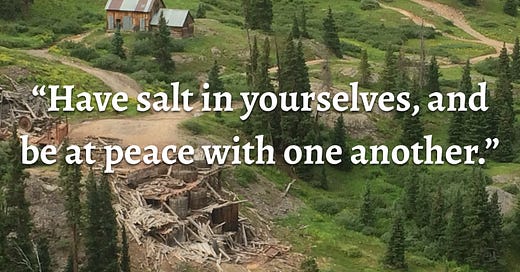Unsalted Salt?
This is one of the utterances of Jesus which seems the most odd. What does it mean?
Mark 9:49 ESV - For everyone will be salted with fire.
…says Jesus, meaning that suffering and even persecution for his sake and the gospels will be normative in the kingdom, meaning that as his disciples we need to give ourselves to him, our lives, in self-sacrificing ways, living for him and for his kingdom and glory, not for ourselves.
But then he says this…
Mark 9:50 ESV - Salt is good, but if the salt has lost its saltiness, how will you make it salty again? Have salt in yourselves, and be at peace with one another.”
The final segue in this section is one of salt. We go from salt used with fire as a metaphor for sacrifice to salt as a preservative that is necessary to maintain life. In a desert culture with no means of refrigeration salt was the means of preserving food. Without salt they were in trouble. The main source of salt was the Dead Sea. The problem with salt from the Dead Sea was that it was not always pure. Salt that “had lost its saltiness” referred to gypsum which was sometimes sold mistakenly as salt but wasn't salty at all. The implication is that salt which is not salty is worthless and cast out.
So be salty. In other words, be faithful to Christ. Live out your faith. Love God with all your being. Let that love for God be shown in your willingness to love your neighbor—in practice not just in feeling. Don’t be ashamed of Christ. Don’t forsake him no matter what it costs. Will we sin? Fail? Fall short? Certainly. As John states in his epistle, yes we will sin, but when we sin we have an Advocate with the Father. Let us go to him, confessing and forsaking and trusting and let us remain faithful to Christ.
“Have salt in yourselves, and be at peace with one another.”
If we all focus on Christ and how amazing it is to be loved by him and how wonderful it is to be able to return that love, especially in loving others, there will be no more strife such as the disciples had on the road as they argued about who would be the greatest. Can you imagine Christians talking out their differences, loving each other in spite of them, and encouraging one another in the gospel? Be at peace with one another, Jesus says. Live sacrificial lives trusting in Jesus.
I’m tempted to leave us right here before turning the page to chapter 10, but there’s one other short thought I want to draw your attention to before we close chapter 9…
Did you notice how Jesus takes the passage in Isaiah, that last verse describing the final judgment of the nations who refuse Yahweh’s rule, and applies it to himself? and to the kingdom he is about to inaugurate? Yes, he just did that. Jesus makes himself the focus of Isaiah. He puts himself in the place of Yahweh, and he makes himself the focal point of faith. Faith in Jesus equals faith in Yahweh God of Israel. Jesus is the polarizing figure in world history, for he is the God-man come to save. What side of the fence we are on when it comes to Jesus means everything.



